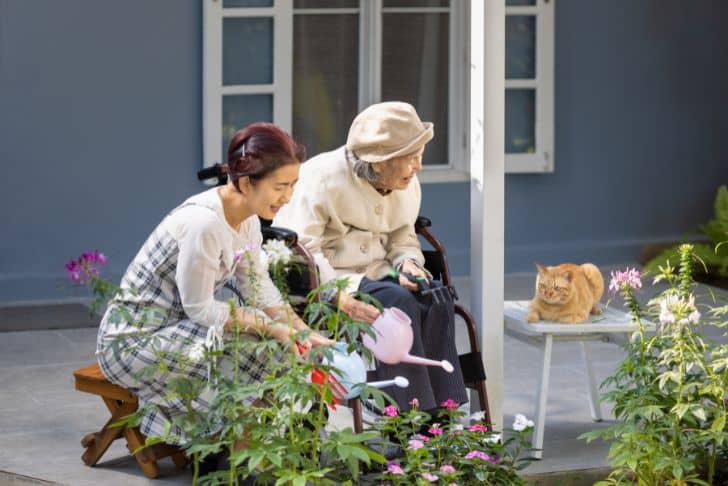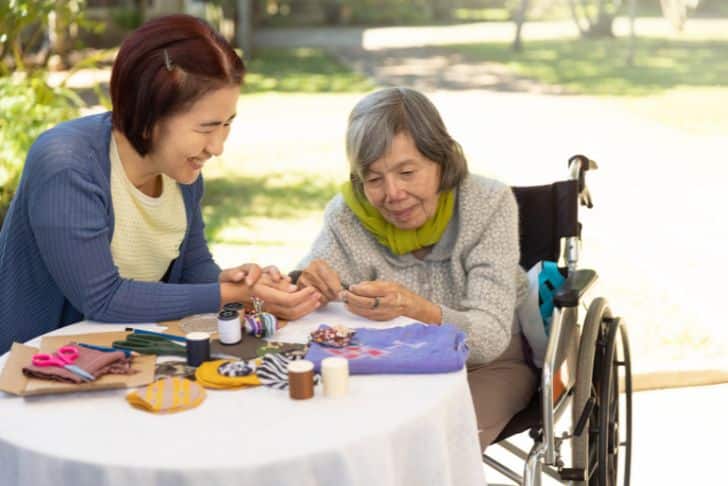Peering into the heart of the Family Caregiver Alliance’s insightful guide, you’ll find a trove of practical advice on handling dementia behaviors in your loved ones. Recognizing dementia as a progressively developing biological brain disorder affecting various facets like memory, thinking, communication, and behavior is a fundamental point. The guide suggests enhancing your communication skills, employing strategies like setting a positive mood, clear messaging, asking simple questions, attentive listening, and more to foster improved relations and reduce caregiving stress. Understanding and navigating dementia-induced behaviors such as wandering, incontinence, agitation, and more requires a blend of compassion, flexibility, patience, and a healthy dose of humor. Rather than striving to control these behaviors, the guide encourages accommodating them, remaining alert for medical issues, preparing for changing strategies, and seeking support from others. It also points you towards valuable resources like the local Alzheimer’s Association, support groups, and the California Caregiver Resource Center.

Understanding Dementia as a Brain Disorder
In order to effectively manage dementia, it’s important to fully understand the nature of the disorder. At its core, dementia is a biological brain disorder. Due to certain biological changes in the brain, it progressively affects the patient’s cognitive functions.
The Biological Nature of Dementia
Dementia manifests as a result of specific biological changes in the brain. It’s not as straightforward as simply forgetting things; rather, the brain’s pathways and connections are gradually breaking down over time due to the deterioration of brain cells. This neurological degeneration is what ultimately leads to the manifestations of dementia.
Effects of Dementia: Memory, Thinking, and Behavioral Changes
The consequences of dementia are profound as it affects memory, thinking, and behavioral skills. You may initially notice a person struggling to remember recent events or losing their way in familiar settings. As it progresses, reasoning, communication and self-care skills may also decline.
Progressive Deterioration Due to Dementia
Given the degenerative nature of dementia, it’s important to note that the symptoms invariably get worse over time. This progressive deterioration impacts not only the patient but also those around them, making it crucial to develop the necessary skills for effective caregiving.
Skills Enhancement for Caregiving
To make the journey of caregiving less stressful and more effective, it’s important to enhance your caregiving skills, particularly in the area of communication.
Improving Communication with Dementia Patients
Communicating can be challenging when dealing with dementia patients, due to the cognitive impairments they are experiencing. However, you can improve the way you communicate by approaching the individual in a calm and patient manner, using simple and clear language, and listening attentively.
Various Tips for Effective Communication
Effective communication involves several key elements. Maintaining a positive mood, stating your messages clearly, asking simple questions, breaking down activities into steps, providing reassurance, and keeping a sense of humor are all effective strategies.
Importance of Setting a Positive Mood
Your attitude and body language communicate your feelings far more often than your words do. Therefore, set a positive mood by speaking to your loved one in a pleasant, respectful manner.
The Role of Attentiveness and Patience in Caregiving
Being attentive and patient significantly contributes to successful caregiving. Remember, the person with dementia is not being difficult on purpose. Their behaviors and emotions are affected by the disease, so take a deep breath and try to provide comfort and reassurance.
Dealing with Dementia Behaviors
Handling dementia behaviors can be challenging. It requires understanding, creativity, and flexibility.
The Need for Understanding, Creativity, and Flexibility
Dealing with the behaviors can be difficult, but having understanding, creativity, and flexibility can make the process more manageable. Understanding the reasons behind the behaviors, being creative in your responses, and being flexible enough to adapt your way of interacting can mitigate the difficulties.
Practicing Compassion and Maintaining a Sense of Humor
Maintaining compassion and a sense of humor can make a significant difference in your journey as a caregiver. Remembering the person behind the dementia and finding joy and humor in your shared experiences can help keep your relationship strong.
Strategies for Dealing with Challenging Behaviors
Strategies for handling challenging behaviors include listening to worries with empathy, redirecting attention when behaviors become difficult, offering reassurance, and ensuring physical comfort. Try different strategies and discover what works best for your situation.
Common Dementia-Associated Behaviors
Dealing with dementia can be more manageable if you recognize common behaviors associated with the disorder.
Wandering Due to Various Reasons
Patients may start wandering due to several reasons – boredom, confusion or the need for exercise. Proper safety measures and distractions can help prevent or reduce wandering.
Understanding and Managing Incontinence
Incontinence can be a challenge in dementia care. Understanding it as a part of the disease and not a deliberate action can help manage the situation better. Regular toilet breaks, easy-to-remove clothing and nighttime protection can help manage incontinence.
Handling Agitation and Repetitive Behaviors
Agitation can be expressed in various ways including restlessness, verbal or physical aggression. Similarly, repetitive behaviors can also be challenging. Staying calm, providing reassurance, and avoiding confrontations can help manage these behaviors.
Dealing with Paranoia, Sleeplessness, and Sundowning
Paranoia, sleep problems, and sundowning are not uncommon in dementia patients. Providing comfort, maintaining a routine, and ensuring a safe environment can help manage these behaviors.
Changes in Eating and Nutrition Habits
Changes in eating habits and nutritional needs are often seen in dementia. Maintaining a balanced diet, making mealtimes enjoyable, and using adaptive tools can help manage these changes.

Approach to Managing Dementia Behaviors
The management of dementia behaviors should not be about controlling it, but rather accommodating the behavior and creating a supportive environment.
Accommodating Versus Controlling Behaviors
Whenever possible, try to accommodate the behavior, not control it. Celebrate the patient’s efforts rather than focusing on what they can no longer achieve.
Medical Check-Ups for Underlying Issues
Regular medical checkups can help identify any underlying health issues that might be causing or exacerbating dementia behaviors.
Recognizing Triggers for Dementia Behaviors
Triggers such as certain situations, interactions, or even times of the day can exacerbate dementia behaviors. Recognizing and minimizing these triggers can help manage the behaviors better.
Preparing for Changes in Effective Strategies
Over time, strategies that used to work may become ineffective due to the progression of dementia. Therefore, caregivers should always be prepared for changes and be flexible in their approaches.
Seek Support from Others
While you might often feel alone in your journey as a caregiver, seeking support from others can provide relief.
Importance of Caregiver’s Support Network
A strong support network can provide both practical and emotional support. Reach out to family, friends, and local community organizations.
Emotional Relief from Support Groups and Counseling
Joining support groups and seeking counseling can provide emotional relief and practical tips from those who understand your situation.
Sharing Experiences with Other Caregivers
Sharing your experiences with others can provide solace in knowing you are not alone while also learning from the experiences of others.
Use of Available Resources
Make use of the various available resources to help ease your caregiving journey.
Leveraging Local Alzheimer’s Association Chapters
Your local Alzheimer’s Association chapter can offer a wealth of information, resources, and support.
Benefiting from the Area Agency on Aging Services
The Area Agency on Aging provides services and resources for seniors and their caregivers.
Utilizing Resources at California Caregiver Resource Center
The California Caregiver Resource Center offers family caregivers free services such as counseling, care planning, and education.
Navigating Assistance with Family Care Navigator
The Family Care Navigator can help guide you towards resources specifically designed for those caring for someone with dementia.

Advice from the Family Caregiver Alliance
The Family Caregiver Alliance offers valuable guidance and support that are beneficial to caregivers.
Guidelines Provided by the Family Caregiver Alliance
The Alliance provides guidelines that can help you navigate through your journey as a caregiver. These guidelines range from how to manage behaviors to how to take care of yourself as a caregiver.
Implementing Tips and Advice in Daily Caregiving
Implement tips and advice from the Family Caregiver Alliance in your day-to-day caregiving tasks. Even small adjustments can significantly improve your strategies.
Adapting Alliance’s Recommendations Based on Individual Situations
Every person with dementia is different. While general advice is beneficial, always adapt recommendations to suit your individual situations.
Coping with the Stress of Caregiving
Caregiving can come with physical and emotional stress. It’s crucial to find ways to take care of your health as well.
Physical and Emotional Stress in Caregivers
Both physical and emotional stress are part of the caregiving role. Make sure to acknowledge this and seek help when needed.
Preventing Burnout and Maintaining Self-Care
Preventing burnout should be a priority. This can be achieved by regularly scheduling time for self-care, maintaining a healthy lifestyle, and seeking emotional support when necessary.
Managing Time and Prioritizing Tasks
Effective time management and task prioritization can alleviate some of the burdens of caregiving. It is okay to ask others for help and to let some things go.
Enhancing Quality of Life for Dementia Patients
As a caregiver, you have a critical role in enhancing the quality of life for the person with dementia.
Role of Caregiver in Improving Patient’s Life Quality
A caregiver can greatly improve a dementia patient’s quality of life by providing a safe and calm environment, engaging the person in activities they enjoy, and treating them with dignity and respect.
Activities to Engage and Stimulate Dementia Patients
Choose activities that are enjoyable, satisfying and feasibly carried out by the person with dementia. These activities can stimulate their brain and improve their mood and sense of well-being.
Creating a Safe and Comfortable Environment
Creating a safe and comfortable environment reduces the risk of injuries and can significantly make the person with dementia feel secure and relaxed.
Ensuring Dignity and Respect for the Patient
Despite the changes dementia brings, it’s crucial to remember to treat the person with dignity and respect. They are still the person you knew before dementia – they are simply navigating the world with a new reality.
